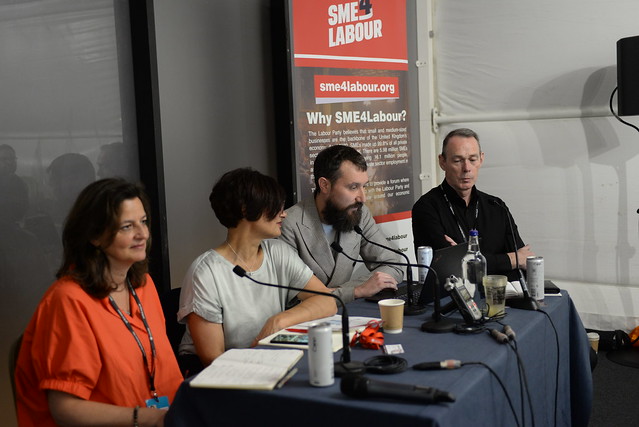The Labour Party Annual Conference 2023
SME4Labour and 89UP fringe: How can Labour make Britain the world’s best home for creative Industries?
🎫 Tickets are free, but booking is required https://www.eventbrite.co.uk/e/673824646657
This event is in the secure zone, so you will need a conference pass to access it.
🗓 Date: Sunday, 8 October 2023
⏳ Time: 14:00
📍Location: SME4Labour POD (Meeting Room 22), ACC Liverpool, Kings Dock Street, Liverpool, England, L3 4FP
SME4Labour & 89UP fringed: How Could Labour Make Britain the World’s Best Home for Creative Industries? with Thangam Debbonaire, Shadow Secretary of State for Culture, Media and Sport; James Burstall, CEO, Argonon and Caroline Norbury, CEO, Creative UK. This panel discussion was chaired by Mike Harris, CEO, 89UP.
In his opening statement, Mike Harrison highlighted the significant role of the creative industries in the UK, underscoring their substantial economic impact, generating nearly £10 billion annually and contributing £50 billion through exports. These industries employ over 2 million people, surpassing sectors like aerospace, life sciences, and oil and gas, making them a vital component of the economy. He emphasized the importance of collaboration within the creative sector to generate constructive ideas.
Thangam Debbonaire, focusing on the creative sector’s needs, stressed the necessity of a supportive government that understands how creative individuals drive economic growth and job creation across the country. She highlighted the sector’s desire for a focus on education to nurture the talents of every child and facilitate the development of creative skills. Additionally, she addressed the importance of addressing regulatory changes, including issues related to the relationship with Europe and touring waivers.
Caroline Norbury echoed the need for an overhaul in the creative curriculum to ensure that arts and creative skills are integrated into education. She called for future governments, particularly a Labour government, to invest in cultural infrastructure, emphasizing two key areas: investment in people and a long-term strategy to combat short-termism, which plagues both businesses and services.
James Burstall delved into the success of the British independent sector, attributing it to the 2003 Communications Act enacted by the Labour Government. This legislation, which granted creators copyright ownership of their productions, significantly contributed to the sector’s growth. In 2003, the sector was valued at around £600 million, whereas it has now grown to an impressive £4 billion. This act facilitated fundamental changes in the industry, particularly in relation to domestic broadcasters.
In summary, the discussion among these experts revolved around recognizing the economic importance of the UK’s creative industries, the need for a government that supports and understands the sector, a focus on education, regulatory changes, and long-term investment strategies to foster continued growth in this vital part of the economy.

